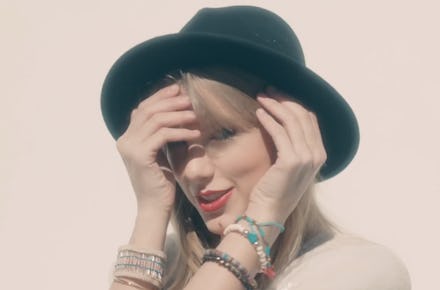Taylor Swift's Wall Street Journal Op-Ed Is a Hopeful Rallying Cry for Musicians Everywhere

After all the concern over the future of the music industry, it's only fitting that the Queen of Break-Up Songs should weigh in with a break-up op-ed of sorts.
In a piece for the Wall Street Journal, Taylor Swift sang the swan song of the old music industry on a note mostly absent from most op-eds on the future of music: optimism.
Image Credit: Getty
She opened with a general plea for artists to believe in the spiritual and monetary value of music and encouraged artists to insist on reasonable compensation:
"Realize [your] worth and ask for it. Music is art, and art is important and rare. Important, rare things are valuable. Valuable things should be paid for. It's my opinion that music should not be free."
Her sentiment is exactly right. It's worth noting, though, that not every talented artist has the clout Swift has, and many can't even get the ear of distributors in order to demand fair pay — especially in an era of extraordinarily low streaming royalties. Nevertheless, she believes there's still money to be found, noting an important fact also often lost in the recent furor over streaming services:
"In mentioning album sales, I'd like to point out that people are still buying albums, but now they're buying just a few of them. They are buying only the ones that hit them like an arrow through the heart or have made them feel strong or allowed them to feel like they really aren't alone in feeling so alone."
She's right there too, to some extent — while CD sales are in dramatic decline (19.6% fewer physical CDs sold at the midway point of 2014 versus the same period in 2013; 11.6% fewer digial albums) vinyl sales were up 40% over the first half of 2013. Even though those albums make up a miniscule portion of the industry, they do signal that fans will pay a premium to own something they love. It's the same reason they pay for Taylor Swift's Enchanted Wonderstruck Eau de Parfum Spray.
Fittingly, Swift has a romantic analogy for how we all find that music in our lives:
"The way I see it, fans view music the way they view their relationships. Some music is just for fun, a passing fling (the ones they dance to at clubs and parties for a month while the song is a huge radio hit, that they will soon forget they ever danced to). Some songs and albums represent seasons of our lives, like relationships that we hold dear in our memories but had their time and place in the past. However, some artists will be like finding 'the one.'"
Cue:
But while she sees the future of music positively, she does rightfully acknowledge that quite a bit has changed — especially as far as an artist controlling his or her image is concerned:
"In the YouTube generation we live in, I walked out onstage every night of my stadium tour last year knowing almost every fan had already seen the show online."
That means artists have to keep surprising their fans and never get complacent — which is only a good thing for keeping music fresh:
"My generation was raised being able to flip channels if we got bored, and we read the last page of the book when we got impatient. We want to be caught off guard, delighted, left in awe."
They also sometimes just want selfies:
"The only memento "kids these days" want is a selfie. It's part of the new currency, which seems to be 'how many followers you have on Instagram.'"
Swift, with 9,738,026 fans Instagram, knows well the power of a social following. Here's a picture she took of Ed Sheeran and a cat who was possibly unaware of his global audience:
Image Credit: Instagram
Fans aren't the only ones concerned with social following, though. In a post big-label era, those are the numbers Swift (among others) thinks will really count:
"For me, this dates back to 2005 when I walked into my first record-label meetings, explaining to them that I had been communicating directly with my fans on this new site called Myspace. In the future, artists will get record deals because they have fans — not the other way around."
But she believes a lot will stay the same too — things like the intense personal scrutiny a lot of fans will bring to her life:
"There will always be an increasing fixation on the private lives of musicians, especially the younger ones. Artists who were at their commercial peak in the '70s, '80s and '90s tell me, 'It was never this crazy for us back then!' And I suspect I'll be saying that same thing to younger artists someday (God help them)."
And she concludes kind of like she's narrating the end of a buddy comedy:
"And as for me? I'll just be sitting back and growing old, watching all of this happen or not happen, all the while trying to maintain a life rooted in this same optimism."
Her optimism is a pleasant change in the bleak forecasting normally running rampant in music op-eds — something her friend, music industry analyst Bob Lefsetz would support. It's worth remembering, though, that Swift's hopeful visions will take a lot of work and change to realize, and fans need to take responsibility, too. Many talented artists never get the chance to develop because it's so hard to break into the industry these days — some mid-list artists who do just as easily fall out due to lack of funding, not just because they didn't demand they be paid what they felt they were worth.
Still, Swift is right to see opportunity in all the upheaval. It's on the audience, though, to make sure that, in 50 years, we'll be able to watch our kids sing along to a song called "72."